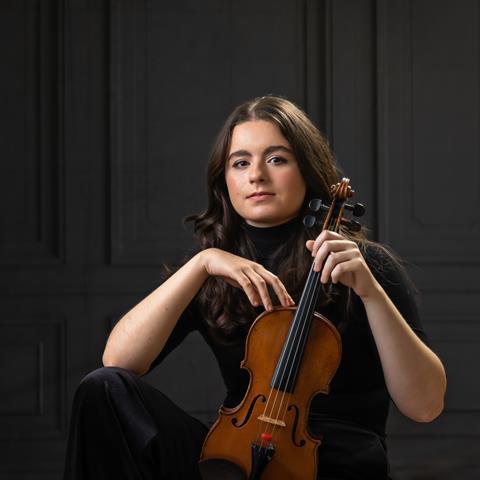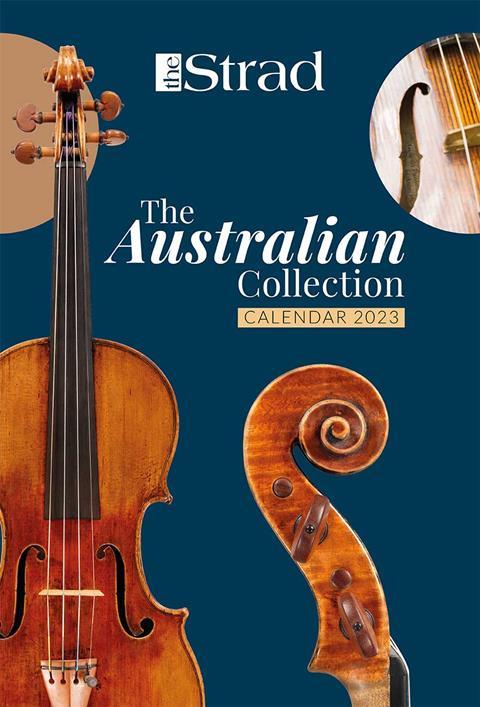The violinist explores a wide range of repertoire on her upcoming debut album, including discoveries of neglected repertoire by Greek composers

Discover more Featured Stories like this in The Strad Playing Hub
It was 2019, right before the pandemic changed everyone’s lives, that I entered the Royal Academy of Music (RAM) as an undergraduate in the class of Rodney Friend, MBE. Fast-forward a few months into the academic year and I found myself, like everybody else, at home where I kept busy practising, reading, and listening to repertoire. During this time, my parents had just started recording projects for a British label, Convivium Records, and eventually the manager heard about me and invited me to record my debut CD.
As a young player, the temptation to take on projects as soon as they appear is great, but I am grateful for the invaluable guidance of my teacher Rodney Friend who asked to initially wait as I transitioned from using a shoulder rest, to a small, soft pad. The ‘voice’ I projected from the violin changed dramatically, and despite the initial difficulty to understand how it may be possible to dispense with the shoulder rest, now I wouldn’t go back. Certainly, the transition to playing without the shoulder rest was done with utmost care and with the option to go back to it if the smallest tension appeared to settle even with good posture.
Read: Ditch the shoulder rest to improve your playing?
Read: My experience: Violinist Lisa Archontidi-Tsaldaraki, Benslow Music Instrument Loan Scheme
The process of choosing the repertoire was one dictated by my affinity for repertoire from the late Romantic era onwards. Attending RAM’s course on British Music and Culture (taught by Dr. Jonathan Clinch), introduced me to Britten’s Suite op.6 and it quickly became an obvious choice. Benjamin Britten (1913–1976) composed the Suite for violin and piano during 1934-35, with the premiere of the complete work occurring in 1936. I recorded the complete suite as a small tribute to mark the 110th year since the composer’s birth. What I particularly liked was that another favourite composer of mine, Prokofiev, had a very great influence on Britten’s music, especially in the manner in which he exploited the violin’s musical and technical capabilities.
The choices of Maurice Ravel’s Tzigane and Karol Szymanowski’s Nocturne and Tarantella also hold special places in my repertoire, making them natural choices for this first disc. The Tzigane is the piece with which I got accepted into Mr. Friend’s class as a private pupil, prior to entering the Academy. It is fun for the performer, exciting for the listener, and a work which gives the opportunity for multiple interpretive approaches.
The Szymanowski, likewise, spoke to me immediately. The influences found in Szymanowski’s repertoire more generally are varied, and notably include extra-musical interests such as Ancient Greek drama and philosophy, which bond his works with my own personal heritage. From my mother’s side the Mediterranean features strongly (with parts of the family from Crete, the Ionian Islands, and even Italy). From my father’s side, the British-Australian heritage is as strong as my paternal grandfather’s Pontic Greek heritage. Szymanowski’s own influences of Debussy, Ravel, Polish and Spanish folklore music, which to my ear sound strangely familiar, resonate deeply with me. They also underline the common thread that ties the Nocturne and Tarantella to the rest of the repertoire presented in the disc.
While searching through new repertoire, I came across Greek composer Manolis Kalomiris (1883-1962) and his Sonata (1948) for violin and piano. Kalomiris is considered the patriarch of the Greek National School and his work is an important contribution to the repertoire, despite it being rarely performed even within Greece. There are very few recordings of his Sonata in existence and I thought that it would be great to pay tribute to my country of birth, especially as Kalomiris is celebrating his 140th birthday this year. I also want to express my gratitude to the Greek researcher, author and critic, Thomas Tamvakos, for providing us with the score of Kalomiris’ Sonata.
The difficulty was both technical and interpretive, for its virtuosic writing but also because of the evident Wagnerian influences, which present equally important melodic material in both the piano and the violin, much like in a music drama. To the ear expecting a homophonic texture, with the piano and the violin taking turns in the spotlight, the Sonata seems relentless. It clearly shows its aesthetic kinship with Wagner in the continuous, challenging pianistic writing which explores the entire range of the instrument, similar to Wagner’s orchestra accompanying the vocal line, which here are represented by the equally virtuosic violin part.
Eventually, we decided to open the recording with the Petite Suite sur des Aires Populaires Grècs du Dodécanèse (1947) composed by another Greek composer, Yannis Constantinidis (1903-1984). Just like my maternal great-grandmother, the composer was born in Smyrna (modern Izmir), and escaped the Destruction of Smyrna in 1922. Like Kalomiris, Constantinidis then left for Germany, continuing his musical studies at the Hochschule in Berlin and relocating permanently to Athens, Greece in 1931.
This is a lighter type of music, bringing light to the dark, frantic colours of the Sonata. For each movement in this Suite, there is a corresponding Greek traditional song, or instrumental dance, which forms the basis. According to existing research, the original songs were initially collected and transcribed by the Swiss musicologist Samuel Baud-Bovy (1906-1986). Constantinidis studied the Anthology, and later dedicated his 22 Songs and Dances from the Dodecanese for piano solo to him. The Suite then, represents a transcription for violin and piano of some of the movements of this earlier piano work.
I hope people with enjoy this recording of revivals, birthdays, and commemorations united in dance and song. I am also very excited to be giving two CD launch concerts: one in the UK, at Benslow ILS (Palmer Hall, Sunday 16 April 2023, 4:30PM) and one in Athens, Greece at the Lilian Voudouris Library of the Athens Concert Hall (G. Marinos Hall, Megaron Mousikis, Friday 19 May 2023, 7:00pm).
Read: Sentimental Work: Leonidas Kavakos
Read: ‘It’s all about the tone and colours’: Anastasiya Petryshak on Ravel
Listen: The Strad Podcast Episode #12: Maxim Vengerov on Ravel
Read more Featured Stories like this in The Strad Playing Hub
The number one source for playing and teaching books, guides, CDs, calendars and back issues of the magazine.
In The Best of Technique you’ll discover the top playing tips of the world’s leading string players and teachers. It’s packed full of exercises for students, plus examples from the standard repertoire to show you how to integrate the technique into your playing.
The Strad’s Masterclass series brings together the finest string players with some of the greatest string works ever written. Always one of our most popular sections, Masterclass has been an invaluable aid to aspiring soloists, chamber musicians and string teachers since the 1990s.
This year’s calendar celebrates the top instruments played by members of the Australian Chamber Orchestra, Melbourne Symphony, Australian String Quartet and some of the country’s greatest soloists.













































No comments yet